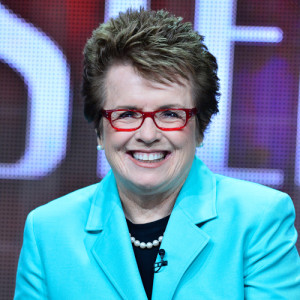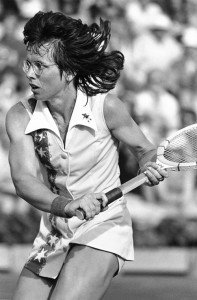Tennis, Women, and Equality
PBS airs ‘American Masters: Billie Jean King’
by Jed Ocot

Tonight on PBS television, the fortieth anniversary of the 1973 Billie Jean King/Bobby Riggs “Battle of the Sexes” tennis match in Houston’s Astrodome will be celebrated by the American Masters series. This inspiring and insightful documentary—the first in this series to profile a sports figure—also takes note of the 1973 founding of the Women’s Tennis Association (WTA) and its role in increasing the cash prizes awarded to female tennis stars.
Many archival photos of King help bring her story to life, and the clips and interviews from her early years show that she was always dedicated to a sport that she found to be much like the art of dancing.
Hillary Clinton, who took notice of the tennis star in the 1960s, recalls in an interview that King was “doing something that I knew was really hard, and she was doing it very well. I was really interested in this person, who seemed to really love what she did.”

King recounts her swift ascent to prominence as a female athlete during a time when tennis was seen mostly as a men’s sport. In addition to fighting for women’s equality, she was one of the first professional female athletes to come out as a lesbian. Her efforts in striving for equality also made her an important figure in the LGBT community.
With very few athletic opportunities for girls to choose from in the 1950s, the idea of playing tennis came from a fifth-grade classmate. King had no idea what tennis was, but she soon jumped at the chance to take part in it. She worked for neighbors doing “pseudo-jobs,” as she put it, to save up for a tennis racket. She chose one in lavender, her favorite color.
To develop her skills, she enrolled in a free tennis class at a public park in Long Beach, California. King’s brother, Randy Moffitt, is interviewed in the film and said that “when she made up her mind to do something, it was gonna get done.”
Even as a young girl, King realized that girls didn’t have as much power as boys did. Girls weren’t listened to in the same way as boys, and girls were rarely called on by teachers.
At the Los Angeles Tennis Club, she began to wonder why everything—and especially everyone—was white. Realizing that her sport was rather elitist, she remembers asking herself as a twelve-year-old, “Where’s everybody else?”
It was also around this time when she decided that she was going to spend the rest of her life dedicated to fighting for equal rights and opportunity. King figured tennis would be the perfect platform to do this, but only if she became the sport’s top female athlete.
The feminist movement had a big influence on King in the sixties, and she realized how important it was for women to band together to make change.
Before 1968, tennis was seen as an amateur sport. King called this “sham-ateurism” because they were paid under the table. Once tennis became a professional sport, equal pay for female athletes became something King and her fellow female players lobbied for.
Not only was the prize money for women becoming an issue, but also the decreasing number of tournaments open to women. King and other female tennis players reached out to World Tennis Magazine publisher Gladys Heldman in Houston for assistance. They signed $1 contracts and set up their own tour sponsored by Virginia Slims cigarettes.
The documentary benefits from the inclusion of those who played alongside King. Some of the “Original Nine” women from the Virginia Slims circuit—Peaches Bartkowicz, Rosie Casals, Julie Heldman (daughter of Gladys), Nancy Richey, and Valerie Ziegenfuss—discuss their struggles and how they overcame them. As Heldman put it, “The women’s movement was going to change things, and we would be a part of that.”
In her career, King won thirty-nine Grand Slam titles, formed the Virginia Slims Series, and founded both the Women’s Sports Foundation and womenSports magazine. In 2009, she was awarded the Presidential Medal of Freedom by President Obama.
The American Masters series premiered in 1986 and has earned twenty-four Emmy Awards, twelve Peabodys, an Oscar, three Grammys, and two Producers Guild of America Awards.
American Masters: Billie Jean King airs Tuesday, September 10, at 8:30 p.m. on PBS (Houston Channel 8).










